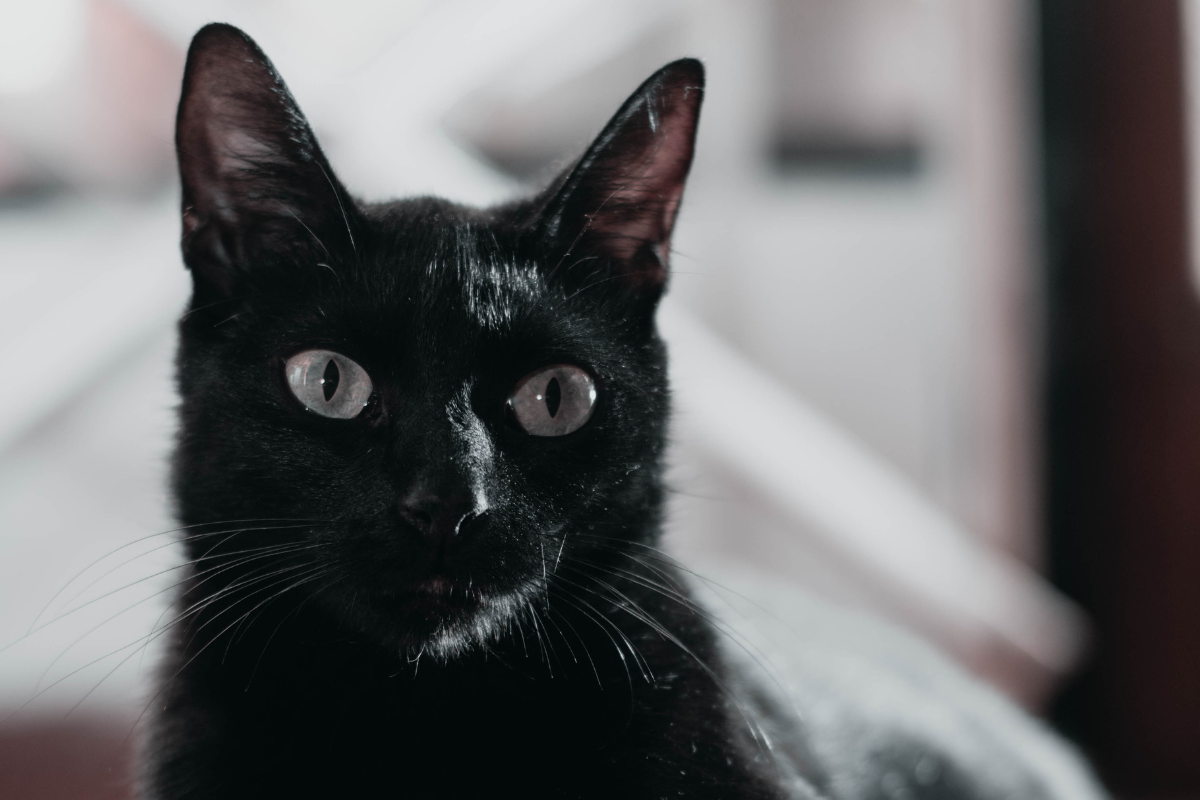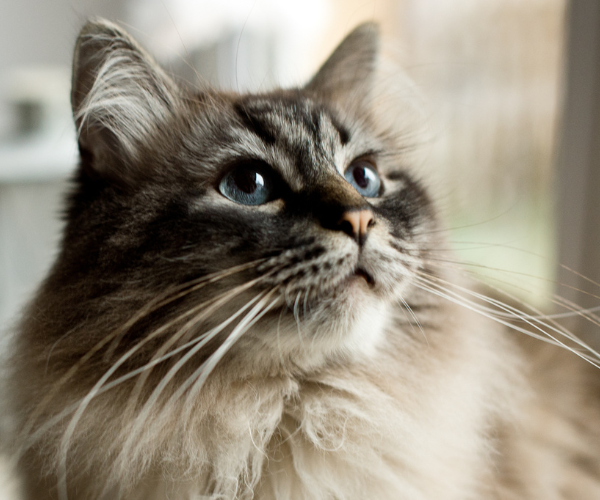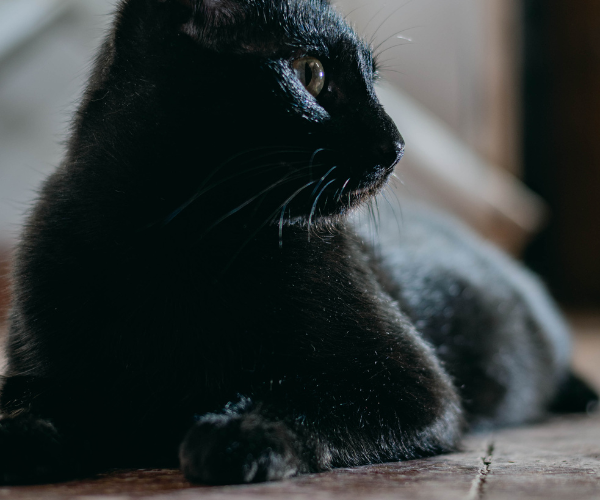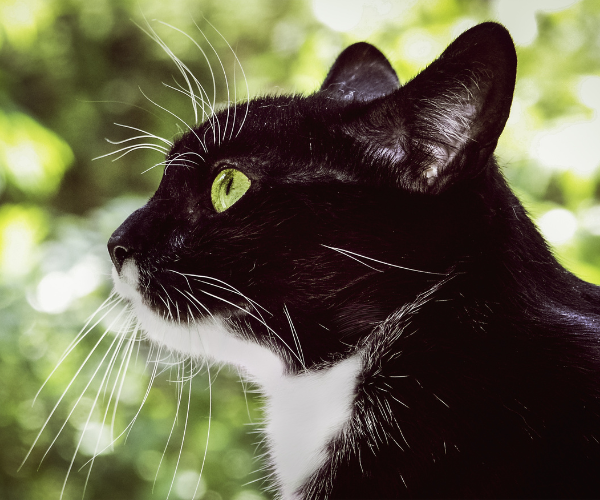Why Are My Cat's Whiskers Turning Black (14 Causes)
Why Are My Cat's Whiskers Turning Black (14 Causes)

Vet Reviewed

By: Sarah Hodgson
January 1, 1970
Table of Contents
If suddenly your cat's whiskers go from white to black it's no surprise that you'll be concerned. However, is this even a cause for concern and why does it even happen?
In this article, we will explore the 14 possible causes of black cat whiskers, ranging from aging to environmental factors.
Let's dive in!
Should I Be Worried If My Cat's Whiskers Are Turning Black?
If you've noticed that your cat's whiskers are turning black, it's natural to feel worried. However, it's important to keep in mind that this change in color may not necessarily indicate a serious problem.
Many cats experience changes in their whisker coloration over time, and this can be perfectly normal. However, if your cat's black whiskers are accompanied by other concerning symptoms such as hair loss, behavioral changes, or skin irritation, it's best to consult with a veterinarian to rule out any underlying health issues.
The 14 Causes Of Black Cat Whiskers
1. Aging
One of the most common reasons for black cat whiskers is simply the natural aging process. Just like humans, cats' hair pigmentation can change as they get older. As a cat ages, the melanocytes, which are the cells responsible for producing pigment, can become less active. This can result in a change in color, causing the whiskers to turn black.
2. Stress
Stress is another factor that can contribute to black cat whiskers. When a cat is under stress, their body releases certain hormones that can affect the pigmentation of their fur, including their whiskers. If your cat has recently experienced a change in their environment, the addition of a new pet or family member, or any other stressful event, their whiskers may turn black as a result.

3. Nutritional deficiencies
A lack of key nutrients in a cat's diet can also lead to black whiskers. Nutritional deficiencies can impact the overall health of a cat, including the pigmentation of their hair. It's important to ensure that your cat is receiving a balanced and complete diet that meets all of their nutritional needs to prevent this potential cause of black whiskers.
4. Feline acne
Yes, cats can develop acne too! Feline acne is a condition that can cause blackheads to form on a cat's chin and lips. In some cases, these blackheads can extend to the whiskers, causing them to turn black. Feline acne can be caused by a variety of factors, including poor grooming habits, allergies, or bacterial infections. If you suspect your cat has feline acne, it's best to consult with a veterinarian for an accurate diagnosis and appropriate treatment.
5. Allergies
Allergies can affect cats just as they do humans. If your cat is allergic to certain substances, such as pollen, certain foods, or environmental irritants, their immune system may respond by producing histamines. These histamines can cause inflammation and pigmentation changes in the skin and hair, including the whiskers. If you suspect your cat has allergies, it's important to identify and eliminate the allergen to prevent further blackening of the whiskers.
6. Hormonal changes
Hormonal changes, such as those that occur during pregnancy or puberty, can also lead to black cat whiskers. These changes in hormone levels can affect the activity of melanocytes, causing the whiskers to darken. If your cat is going through a hormonal transition, such as pregnancy or adolescence, it's not uncommon for their whiskers to turn black temporarily.
7. Infections
Infections, both bacterial and fungal, can also be a culprit behind black cat whiskers. These infections can cause inflammation and pigmentation changes in the hair follicles, resulting in blackening of the whiskers. If you notice any signs of infection, such as redness, swelling, or discharge, it's important to consult with a veterinarian for proper diagnosis and treatment.

8. Trauma or injury
If your cat has recently experienced trauma or injury to their whiskers, this can lead to blackening. Trauma can cause damage to the hair follicles, disrupting the normal pigmentation process and resulting in black whiskers. If your cat has been involved in an accident or has suffered an injury, it's important to seek veterinary care to ensure proper healing and prevent any further complications.
9. Fungal infections
Fungal infections, such as ringworm, can also cause blackening of the whiskers. These infections can be highly contagious and can spread to other areas of the body if left untreated. If you suspect your cat has a fungal infection, it's crucial to seek veterinary attention for proper diagnosis and treatment.
10. Hyperpigmentation
Hyperpigmentation is a condition characterized by the excessive production of melanin, the pigment responsible for hair color. This can cause the whiskers to turn black. Hyperpigmentation can be caused by a variety of factors, including genetics, hormonal imbalances, or certain medications. If you suspect your cat has hyperpigmentation, it's best to consult with a veterinarian for a proper diagnosis and treatment plan.
11. Melanoma
While rare, melanoma, a type of skin cancer, can also cause blackening of the whiskers. Melanoma occurs when melanocytes, the cells responsible for producing pigment, become cancerous. If you notice any changes in your cat's whiskers, such as asymmetry, irregular borders, or rapid growth, it's crucial to seek immediate veterinary attention to rule out the possibility of melanoma.

12. Genetic factors
Genetics can play a role in the coloration of a cat's whiskers. Some cats may naturally have black whiskers due to their genetic makeup. If your cat has always had black whiskers since a young age and is otherwise healthy, this may simply be a natural variation and not a cause for concern.
13. Environmental factors
Certain environmental factors, such as exposure to sunlight or harsh chemicals, can also contribute to black cat whiskers. Sun exposure can cause hair pigmentation changes, including darkening of the whiskers. Additionally, exposure to certain chemicals, such as those found in cleaning products, can cause irritation and pigmentation changes in the hair follicles.
14. External substances
Lastly, external substances, such as dirt or debris, can cause the whiskers to turn black. Cats are curious creatures and can easily come into contact with various substances that can get stuck on their whiskers. If your cat's whiskers are dirty or covered in a foreign material, gently clean them with a damp cloth to restore their natural color.
When To See a Veterinarian
While black cat whiskers can be a normal variation, it's important to know when to seek veterinary attention. If your cat's black whiskers are accompanied by other concerning symptoms, such as hair loss, skin irritation, or behavioral changes, it's best to consult with a veterinarian.
Additionally, if you suspect that your cat's whiskers may be black due to an underlying health issue, such as an infection or tumor, it's crucial to seek immediate veterinary care for proper diagnosis and treatment.
The Bottom Line
So there you have it, black cat whiskers can have a variety of causes, ranging from natural aging to environmental factors. While some causes may be harmless, others may require veterinary attention.
Note
If you have noticed any concerning changes in your cat's whiskers, it's best to consult with a veterinarian for proper diagnosis and guidance. Remember, early detection and treatment can make a significant difference in your cat's health and well-being.
Frequently Asked Questions
Why are my cat's whiskers turning black?
There can be various reasons for this change, ranging from natural aging to underlying health issues. It's essential to consider factors like diet, genetics, and environmental conditions
Can I do anything to restore the original color of my cat's whiskers?
In most cases, the color change is irreversible, especially if it's due to aging or genetics. However, addressing underlying health issues and providing proper care can support your cat's overall health
How can I prevent my cat's whiskers from turning black?
While some factors like aging are natural and unavoidable, maintaining a balanced diet, providing a stress-free environment, and regular veterinary check-ups can contribute to overall well-being.

Subscribe to Petfluence!
Get updates on the latest posts and more from Petfluence straight to your inbox.